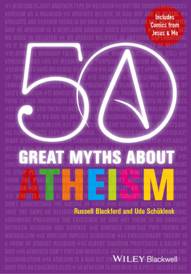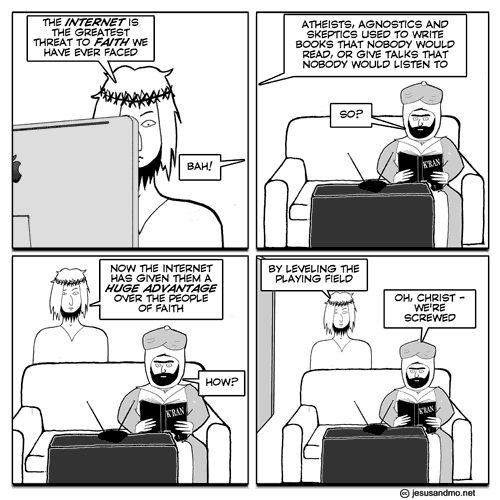
50 Great Myths About Atheism – Russell Blackford and Udo Schüklenk – Book Review
Russell Blackford and Udo Schüklenk – 50 Great Myths About Atheism
When reading such a stimulating book, it is tempting to launch into a full-blown “Why I’m Not an Atheist” essay; or a commentary for each of the 50 myths, one by one. Neither are appropriate for this short book review. I’ll try my best to stick to the task at hand.
The authors write in an accessible style. The 50 myths are collected into eight categories, such as Atheism, Ethics and the Soul and Religion and Science. The reader can easily skim the table of contents, and zero in on the most challenging topics.
With 50 myths to choose from, plus a ninth part that summarises the new atheist movement, readers will find a few surprises in the mix. For example, I was unaware that atheists are accused of communism.
For an academic publication, the book reads as light and entertaining, peppered with humorous cartoons from Mohammed Jones’ Jesus and Mo. But this is not simply fluff. The authors are careful to select real objections, not a set of “easy targets”. Each of the myths is thoroughly referenced, and could be used as a primer for further research into any of the topics.
Parts two through five (or myths 11 – 37) hinge on immature “atheism is yucky!” objections. There are such clangers as Atheists Don’t Give to Charity; Atheists Have No Sense of Humor; and Atheism is Depressing. I agree with the authors – none of these objections necessarily follow from atheism.
My own criticisms of atheism are – at least I hope – not emotional, but epistemological. Firstly, I find the debate to be a polarising oversimplification. With a section entitled Have We Defeated Theism? and constant reference to their “religious apologist” opponents, this book often perpetuates this adversarial position.
Theravada Buddhism is briefly explored as a grey area (p. 12). It is not necessarily theistic, in that it doesn’t posit the existence of gods, but it does involve “supernatural” elements. This leads me to my second criticism of the atheist movement – there is no clear definition of what it means to be an atheist.
The word could be interpreted in at least one of two ways: without theistic belief (what I will call the passive version); or against theistic belief (the active version). This ambiguity comes in handy when atheists are argued into a corner.
 The authors settle on “people who lack belief in any God or gods” (p. 19) as their working definition – which reads like the passive version. They sympathise with a view that, when they’re not writing books about atheism, it is not as central to their lives as religious belief is to religious people (p. 12). I find this unconvincing. When one blogs; speaks on podcasts and in public forums; and publishes articles and books about atheism, I can’t help but see that as an active form of atheism.
The authors settle on “people who lack belief in any God or gods” (p. 19) as their working definition – which reads like the passive version. They sympathise with a view that, when they’re not writing books about atheism, it is not as central to their lives as religious belief is to religious people (p. 12). I find this unconvincing. When one blogs; speaks on podcasts and in public forums; and publishes articles and books about atheism, I can’t help but see that as an active form of atheism.
I can see the motivation for this definition. A major criticism against atheism is that you cannot logically prove a negative. Making the positive claim, that God does not exist, is not something that could ever be proven beyond doubt (what if He’s just hiding in a teapot?). The authors confront this head on in Myth 4 – Atheists are Certain There is No God.
Whether this treatment is satisfying or not is up to the reader. However, the entire structure of this book is, itself, a commendable step in the right direction. You cannot prove a negative, but you can falsify the positive claims of your opponents. This is how science progresses so successfully, and this is exactly the approach taken up by the authors here. They line up 50 claims from their opponents, and shoot them down one by one.
If you’re still coming to grips with your own opinion on this issue, this book is a great introduction to the atheist position. If this is your tenth book on atheism, then it will still help strengthen your arguments, but I also recommend picking up some round pegs that don’t easily fit into the square hole this debate creates. Go read some Carl Jung; Joseph Campbell; Baruch Spinoza; William James; Plotinus; Alan Watts… And that’s just a small portion of the western canon – less than half of the options the world’s cultures have generated.
Official book launch
The Co-op bookshop will be holding an official book launch, presented by Dr. Joe Mintoff, with special guest appearance by author Russell Blackford.
- When: 4:30pm, Tuesday, 22nd October.
- Where: The Co-op bookshop, Shortland Building, University of Newcastle, Callaghan.
- Please RSVP to bwhitehead@coop.com.au by 15th October.
